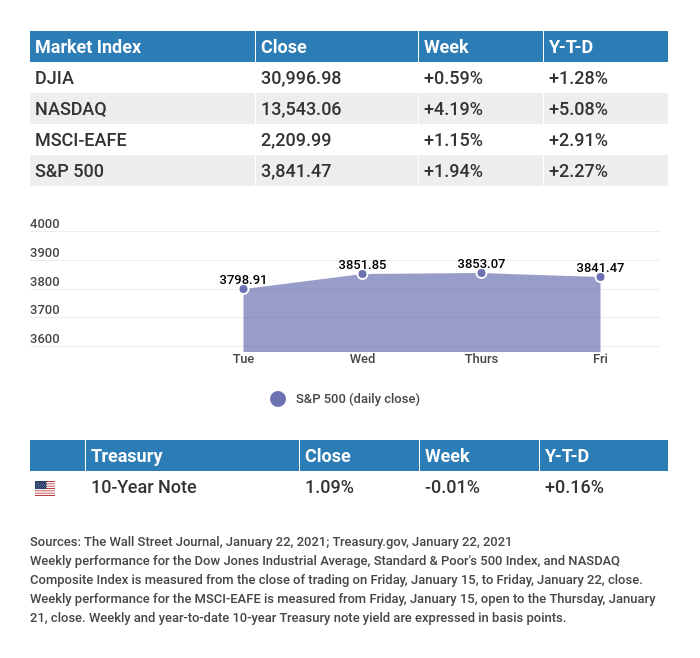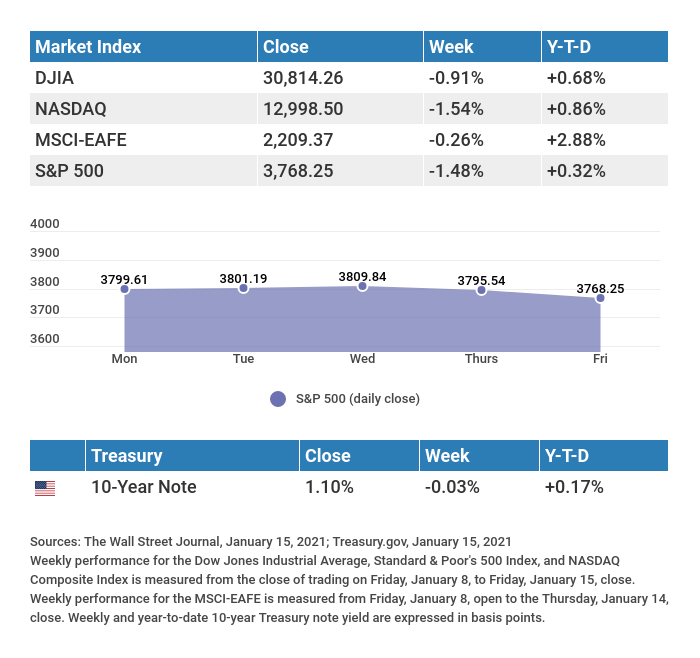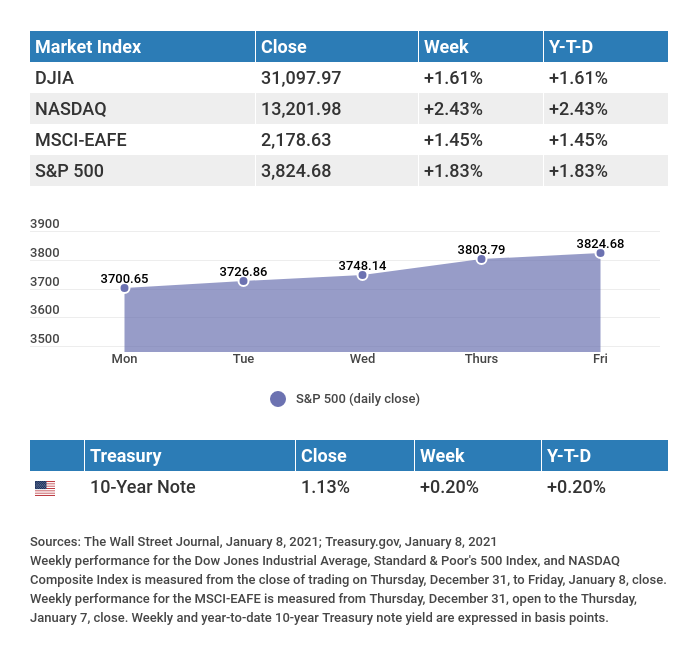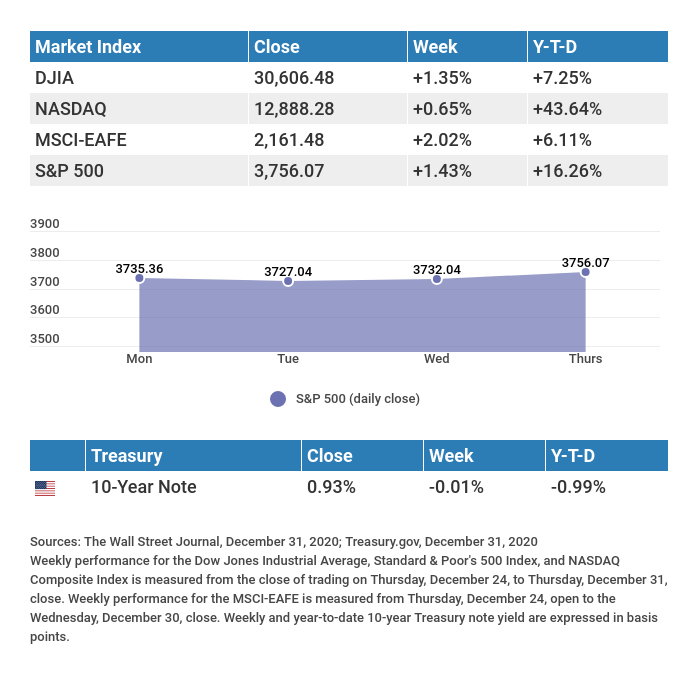Randy C. Benning, CFP Presents:
THE WEEK ON WALL STREET
Anticipation of a new fiscal stimulus and improved vaccine distribution powered stocks to fresh record highs last week with technology stocks leading the way.
The Dow Jones Industrial Average gained 0.59%, while the Standard & Poor’s 500 picked up 1.94%. The Nasdaq Composite index led, gaining 4.19% for the week. The MSCI EAFE index, which tracks developed overseas stock markets, rose by 1.15%.1,2,3
Stocks Scale New Heights
In a holiday-shortened week, stocks rallied as investors welcomed testimony from incoming Treasury Secretary Janet Yellen to the Senate Finance Committee that suggested lawmakers needed to “act big” on fiscal stimulus, raising hopes for a new round of federal spending.
An orderly presidential transition and the anticipation of a more effective vaccine distribution plan contributed to stocks touching multiple new highs last week. Investor enthusiasm was further supported by a strong start to the fourth-quarter earnings season.
Mega-cap technology companies resumed their market leadership ahead of a full calendar of big tech earnings reports this week. Market momentum stalled a bit into the close on concerns that any stimulus spending bill might come in lower than expected.
Earnings Beating Expectations
One of the concerns of market watchers has been the valuations of stocks. Stocks are currently trading at about 23 times 2021 earnings, above the historical range of 15 to 17 times forward earnings.4
Today’s valuations may be explained by expectations of a strong economic rebound and a concomitant rise in corporate profits. So far, this earnings season appears to vindicate the optimism; With 41 of S&P 500 companies reporting through last Thursday, 91% of them have exceeded estimates by an average of 18.5%.5
Investors are expected to continue to watch company earnings in the weeks ahead to see whether these consensus-beating results continue.
T I P O F T H E W E E K
If you want to improve your credit score, an inactive credit card will not help (and it may even hurt). The key factors in credit score determination are recent activity and recent payment history.
THE WEEK AHEAD: KEY ECONOMIC DATA
Tuesday: Consumer Confidence.
Wednesday: Durable Goods Orders. FOMC (Federal Open Market Committee) Announcement.
Thursday: Gross Domestic Product (GDP). Jobless Claims. New Home Sales.
Source: Econoday, January 22, 2021
The Econoday economic calendar lists upcoming U.S. economic data releases (including key economic indicators), Federal Reserve policy meetings, and speaking engagements of Federal Reserve officials. The content is developed from sources believed to be providing accurate information. The forecasts or forward-looking statements are based on assumptions and may not materialize. The forecasts also are subject to revision.
THE WEEK AHEAD: COMPANIES REPORTING EARNINGS
Monday: KimberlyClark (KMB).
Tuesday: Microsoft (MSFT), General Electric (GE), Advanced Micro Devices (AMD), Verizon (VZ), Johnson & Johnson (JNJ), Lockheed Martin (LMT), Starbucks (SBUX), 3M Company (MMM), Texas Instruments (TXN), Novartis (NVS), D.R. Horton (DHI).
Wednesday: Apple (AAPL), Facebook (FB), AT&T (T), Boeing (BA), Abbott Laboratories (ABT), ServiceNow, Inc. (NOW), General Dynamics (GD), Norfolk Southern (NSC).
Thursday: McDonalds (MCD), Comcast Corp. (CMCSA), Southwest Airlines (LUV).
Friday: Caterpillar (CAT), Chevron (CVX), Eli Lilly (LLY), Honeywell International (HON), Charter Communications (CHTR).
Source: Zacks, January 22, 2021
Companies mentioned are for informational purposes only. It should not be considered a solicitation for the purchase or sale of the securities. Investing involves risks, and investment decisions should be based on your own goals, time horizon, and tolerance for risk. The return and principal value of investments will fluctuate as market conditions change. When sold, investments may be worth more or less than their original cost. Companies may reschedule when they report earnings without notice.

Randy C. Benning, CFP®, President, License # 0816882, Benning Financial Group, LLC. Investment Advisory Services offered through Benning Financial Group, LLC, A Registered Investment Advisor, Benning Financial Group, LLC
Investing involves risks, and investment decisions should be based on your own goals, time horizon, and tolerance for risk. The return and principal value of investments will fluctuate as market conditions change. When sold, investments may be worth more or less than their original cost.
The forecasts or forward-looking statements are based on assumptions, may not materialize, and are subject to revision without notice.
The market indexes discussed are unmanaged, and generally, considered representative of their respective markets. Index performance is not indicative of the past performance of a particular investment. Indexes do not incur management fees, costs, and expenses. Individuals cannot directly invest in unmanaged indexes. Past performance does not guarantee future results.
The Dow Jones Industrial Average is an unmanaged index that is generally considered representative of large-capitalization companies on the U.S. stock market. Nasdaq Composite is an index of the common stocks and similar securities listed on the Nasdaq stock market and is considered a broad indicator of the performance of technology and growth companies. The MSCI EAFE Index was created by Morgan Stanley Capital International (MSCI) and serves as a benchmark of the performance of major international equity markets, as represented by 21 major MSCI indexes from Europe, Australia, and Southeast Asia. The S&P 500 Composite Index is an unmanaged group of securities that are considered to be representative of the stock market in general.
U.S. Treasury Notes are guaranteed by the federal government as to the timely payment of principal and interest. However, if you sell a Treasury Note prior to maturity, it may be worth more or less than the original price paid. Fixed income investments are subject to various risks including changes in interest rates, credit quality, inflation risk, market valuations, prepayments, corporate events, tax ramifications and other factors.
International investments carry additional risks, which include differences in financial reporting standards, currency exchange rates, political risks unique to a specific country, foreign taxes and regulations, and the potential for illiquid markets. These factors may result in greater share price volatility.
Please consult your financial professional for additional information.
This content is developed from sources believed to be providing accurate information. The information in this material is not intended as tax or legal advice. Please consult legal or tax professionals for specific information regarding your individual situation. This material was developed and produced by FMG Suite to provide information on a topic that may be of interest. FMG is not affiliated with the named representative, financial professional, Registered Investment Advisor, Broker-Dealer, nor state- or SEC-registered investment advisory firm. The opinions expressed and material provided are for general information, and they should not be considered a solicitation for the purchase or sale of any security.
Copyright 2020 FMG Suite.
CITATIONS:
1. The Wall Street Journal, January 22, 2021
2. The Wall Street Journal, January 22, 2021
3. The Wall Street Journal, January 22, 2021
4. CNBC, January 21, 2021
5. Earnings Scout, January 21, 2021


